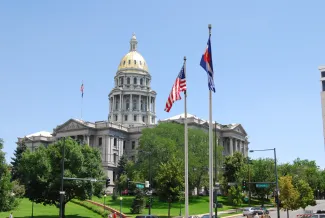
TABOR refunds would become income tax cuts under Colorado bill
(Colorado Newsline) Colorado’s income tax rate could get cut in years that the state’s revenue exceeds a constitutional limit under a bipartisan bill lawmakers are considering during the last week of the state legislative session.
The bill considers a Taxpayer’s Bill of Rights refund mechanism that would reduce the state’s sales tax if the surplus exceeds $1.5 billion and the individual income tax rate when the surplus exceeds $300 million, after the state reimburses local governments for homestead property tax exemptions. Those sales and income tax mechanisms would be in place until the 2034-35 fiscal year.

“This will allow people to see the savings on every purchase they make during the fiscal year and efficiently provide relief to people through the year versus a one time check,” said Senate Minority Leader Paul Lundeen, a Monument Republican, during the bill’s Thursday afternoon committee hearing.
Under the TABOR constitutional amendment, the state has to repay money to taxpayers when revenue is above an amount set by population growth and inflation. This fiscal year, that excess is estimated to be about $2 billion to be refunded next tax cycle. The state has a handful of ways to return the money, such as a tiered sales tax, property tax exemptions and, most recently, equal checks to every taxpayer.
Colorado currently has a 4.4 percent income tax rate, but under the bill the 2024 tax year, which begins July 1, would see a 4.25 percent rate.
Senate Bill 24-228 proposes greater income tax reductions with greater TABOR surpluses:
- A 0.04 percent cut in years where the surplus is between $300 million and $500 million
- A 0.07 percent cut on years where the surplus is between $500 million and $600 million
- A 0.09 percent cut in years where the surplus is between $600 million and $700 millionA 0.11 percent cut in years where the surplus is between $700 million and $800 million
- A 0.12 percent cut in years where the surplus is between $800 million and $1 billion
- A 0.13 percent cut in years where the surplus is between $1 billion and $1.5 billion
- A 0.15 percent cut in years where the surplus is greater than $1.5 billion
The state’s 2.9 percent sales tax would be reduced to 2.77 percent for one year if the surplus is expected to be above $1.5 billion during the state’s March economic forecast.
Heidi Humphreys, who heads the state’s Department of Revenue, praised the bill on Thursday and said the proposed refund mechanisms would “return money to taxpayers more efficiently and smooth out state revenues.”
Governor Jared Polis has repeatedly expressed support for income tax reductions, including in his State of the State address earlier this year.
The bill passed unanimously out of committee on Thursday and now heads to the Senate Appropriations Committee. It is sponsored by Lundeen and Democratic Senator Kyle Mullica of Thornton in the Senate and by Democratic Representative Chris deGruy Kennedy of Lakewood and Republican Minority Leader Rose Pugliese of Colorado Springs.
The legislative session ends May 8.
Colorado Newsline is part of States Newsroom, a nonprofit news network supported by grants and a coalition of donors as a 501c(3) public charity. Colorado Newsline maintains editorial independence. Contact Editor Quentin Young for questions: info@coloradonewsline.com. Follow Colorado Newsline on Facebook and Twitter.

















